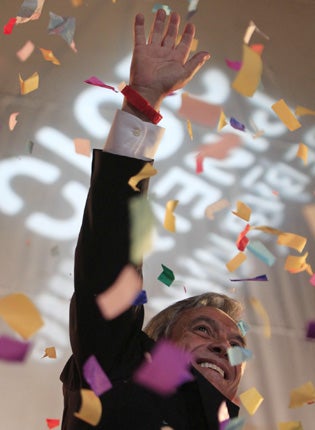Billionaire's victory sees Chile swing to the right
Presidency goes to conservative after 20 years of leftist rule

Your support helps us to tell the story
From reproductive rights to climate change to Big Tech, The Independent is on the ground when the story is developing. Whether it's investigating the financials of Elon Musk's pro-Trump PAC or producing our latest documentary, 'The A Word', which shines a light on the American women fighting for reproductive rights, we know how important it is to parse out the facts from the messaging.
At such a critical moment in US history, we need reporters on the ground. Your donation allows us to keep sending journalists to speak to both sides of the story.
The Independent is trusted by Americans across the entire political spectrum. And unlike many other quality news outlets, we choose not to lock Americans out of our reporting and analysis with paywalls. We believe quality journalism should be available to everyone, paid for by those who can afford it.
Your support makes all the difference.Chile woke to a new political era yesterday after voters handed power to a billionaire conservative businessman. Sebastian Piñera's win in Sunday's presidential run-off marks an emphatic shift to the right for the South American nation, dropping the curtain on two decades of rule by the left.
Mr Piñera, 60, an avid sports fan and business tycoon with interests in a series of companies, most notably the flag-carrier airline LAN, emerged with 52 per cent of the vote, handily defeating Eduardo Frei, a former president and leader of a fractured coalition of leftist parties.
By swinging behind a conservative, for the first time in 20 years voters were able to chase away the ghosts that have haunted the country since the dictatorship of General Augusto Pinochet, who held it in his iron grip from 1973 to 1990 after ousting the leftist government of Salvador Allende. It is the first time in 50 years that the right has won the presidency in Chile by democratic vote.
During the run-off, Mr Frei, who led Chile from 1994 to 2000, attempted to remind Chile of the conservatives' ties to the Pinochet legacy but failed to galvanise his grassroots base. During Pinochet's regime, more than 3,000 people were killed or "disappeared" and 28,000 were tortured.
The left's loss came in spite of the enduring popularity of the outgoing Chilean leader, Michelle Bachelet, who had successfully kept her leftist coalition intact. Barred by the constitution from running for a second term, she has maintained stellar approval ratings of around 75 per cent. But her political sheen failed to rub off on Mr Frei.
It may have been sheer weariness with the left, in spite of years of relative economic prosperity, that persuaded Chileans that the time had come to changes horses in government. Their rightward shuffle will be seen as countering several years of the region trending in the other direction, with leftist governments now in charge in countries from Venezuela to Brazil and Uruguay.
Mr Piñera's victory sent the Chilean stock market towards new highs yesterday amid hopes that upon taking office in March he will move quickly to enact a programme of economic expansion. There was uncertainty, however, surrounding the future ownership of LAN. Mr Piñera holds a controlling 25 per cent stake in the carrier but promised to divest that interest in the event he was elected.
Although he will take office with a convincing popular mandate, Mr Piñera will face strong leftist headwinds in the country's congress in Santiago, making it likely that he will have to compromise on some of the goals set out during the election. However, he extended an olive branch to the left, standing beside his foe, Mr Frei, on Sunday evening, when he delivered his victory speech and arranging a breakfast with Ms Bachelet in the presidential palace in the capital, Santiago, yesterday morning.
"The problems we face in the future are great, the obstacles we face are very challenging and we need unity now more than ever," Mr Piñera told his supporters on Sunday evening. "We will form a government of national unity which will build bridges of understanding and knock down walls of division."
While Mr Piñera has promised some financial reforms, including a shake-up of Codelco, Chile's enormous state-run copper-mining company, most economists expect him to keep Chile on the mostly steady course set by Ms Bachelet.
Challenging tradition Michelle Bachelet
*Chile's outgoing and hugely popular President Michelle Bachelet was the country's first female head of state. She won praise for her social programmes and leaves office with an approval rating of 81 per cent.
*A single parent, she challenged socially conservative traditions by making contraception freely available to teenagers and rolling out free childcare for working women. She drew criticism from political rivals for engaging in lengthy consultations before taking decisions.
*Bachelet complained about "macho" attitudes to women politicians and accused her male counterparts including Hugo Chavez of Venezuela of "hysterical" behaviour.
Join our commenting forum
Join thought-provoking conversations, follow other Independent readers and see their replies
Comments